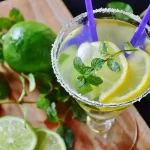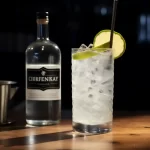Gin is a popular alcoholic drink that has been around for centuries. Made from a mixture of botanicals and distilled spirits, gin has a distinct flavor that has made it a favorite among many. While most people enjoy gin for its taste, it’s worth noting that gin also has several health benefits. In this article, we’ll explore the history, ingredients, health benefits, and serving suggestions of gin.
Ingredients of Gin
Juniper berries are the primary ingredient in gin, giving it its signature flavor. However, other botanicals such as coriander, angelica root, and citrus peel are also commonly used in gin production. These botanicals are infused into the spirit during distillation, giving gin its unique taste and aroma.
Health Benefits of Gin
While alcohol consumption is generally considered unhealthy, moderate gin consumption has been linked to several health benefits. Some of these benefits include:
Lowers Risk of Heart Diseases
Juniper berries are a rich source of antioxidants, which help protect the heart from damage caused by free radicals. Studies have shown that moderate gin consumption can reduce the risk of heart disease and stroke.
Relieves Joint Pains and Arthritis
Juniper berries have anti-inflammatory properties, which can help relieve joint pains and arthritis. Gin consumption has been linked to reducing inflammation and pain associated with arthritis.
Helps in Digestion
Gin contains several botanicals that aid digestion, including coriander, angelica root, and citrus peel. These ingredients can help stimulate the production of digestive enzymes, which can improve digestion.
Enhances Mental Health
Gin is a natural mood enhancer, and its botanicals can have a calming effect on the body. Moderate gin consumption has been linked to reducing stress and anxiety levels.
Gin vs Other Alcoholic Drinks
Compared to other alcoholic drinks, gin is relatively low in calories and sugar. It’s also less likely to cause a hangover compared to other spirits such as whiskey or tequila. Gin is a popular choice among health-conscious drinkers who want to enjoy alcohol without the negative side effects.
Serving Suggestions for Gin
Gin can be enjoyed in many ways, from a classic gin and tonic to a more complex cocktail. For a classic gin and tonic, mix one part gin with two parts tonic water and garnish with a lime wedge. For a more complex cocktail, try a gin martini or a negroni.
Precautions and Side Effects of Gin Consumption
While moderate gin consumption can have health benefits, excessive consumption can be harmful. Drinking too much gin can lead to alcohol poisoning, liver damage, and increased risk of cancer. It’s essential to drink gin in moderation and avoid binge drinking.
Gin may also interact with certain medications, so it’s crucial to talk to a healthcare provider before consuming gin if you’re taking any prescription medications.
Conclusion
In conclusion, gin is not just a delicious drink but also has several health benefits. From lowering the risk of heart diseases to aiding digestion, gin’s botanicals have a positive impact on the body. However, it’s crucial to drink gin in moderation and avoid binge drinking to avoid the negative side effects of excessive alcohol consumption.
FAQs
- Is gin a low-calorie alcoholic drink?
- Yes, compared to other alcoholic drinks, gin is relatively low in calories and sugar.
- Can gin help relieve joint pains?
- Yes, gin’s primary ingredient, juniper berries, have anti-inflammatory properties that can help relieve joint pains and arthritis.
- Does gin consumption have any negative side effects?
- Excessive gin consumption can lead to alcohol poisoning, liver damage, and increased risk of cancer. It’s essential to drink gin in moderation and avoid binge drinking.
- Can gin interact with certain medications?
- Yes, gin may interact with certain medications, so it’s crucial to talk to a healthcare provider before consuming gin if you’re taking any prescription medications.
- What are some popular gin recipes to try at home?
- Some popular gin recipes to try at home include the classic gin and tonic, gin martini, and negroni.









